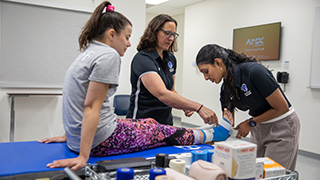Seton Hall Philosophy Professor Uncovers Aristotle in Italy
Friday, February 21, 2025

Robert Mayhew Ph.D.
While many flocked to the Shore in summer, Robert Mayhew Ph.D., swapped out the Garden State for the Italian city of Padova, to gather with a group of fellow scholars attempting to uncover lost works of Aristotle. These works survived antiquity on papyrus scrolls but were not copied onto the kinds of vellum manuscripts that have survived over time. But other ancient figures, whose writings have survived, often quoted from these now elusive texts. Fragments of these works are known to have survived in this excerpted form, and scholars aim to piece together their remains.
During his week as a visiting scholar at the University of Padova, Mayhew presented two lectures: “Mining for Lost Aristotle in Byzantine” and “Aristotle’s Lost Zoïka: An Introduction.” These lectures discussed various ancient and Byzantine authors who quote Aristotle’s lost work Zoïka or “animal matters.”
The Zoïka is supposed to have been a collection of data about a large range of animals, based on Aristotle’s observations and other reports, often about animals from faraway lands, for instance, “claims about extraordinary animals were reported in India.” It was likely organized according to the broad classes of animals: fish, birds, insects, etc. In Padova, Mayhew spent a lot of time in the University’s libraries, concentrating on obscure Byzantine works, looking for reliable sources and using quoted passages and references in them to expand our knowledge of the Zoïka. In working on this project, Mayhew pays special attention to Aristotle’s “interest in explaining why things are the way that they are, in relation to animals, and the role this collection of data may have played in his biological inquiries.”
Seton Hall has a robust Department of Philosophy with a wide range of faculty researching the history of philosophy (ancient and modern), ethics (theoretical and applied), philosophy of law and other areas. These fields involve robust thinking about meaning, knowledge, justice, goodness, logic, taxonomy, life and artificial intelligence; students studying philosophy can pursue a major or minor in Philosophy, as well as focused minors in Ethics or Applied Ethics, along with a Pre-Law Emphasis for those considering law school. Philosophy majors consistently outperform on the LSAT exam.
From gaining strong training in both analytic skills and writing, the flexible nature of the Department allows each student to pursue their passions and prepare for rewarding and purposeful careers. Students interested in learning more about the lost works of Aristotle should reach out to Mayhew at [email protected] , while those interested in learning more about the Department of Philosophy should contact Travis Timmerman, Ph.D., at [email protected].
Categories: Arts and Culture






